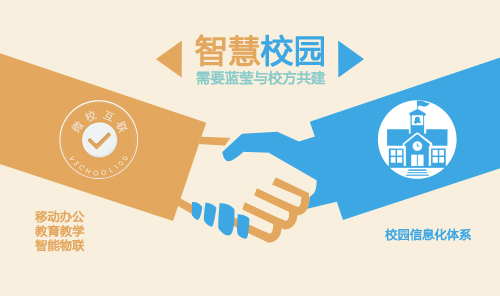From digital technology such as computers, the Internet, and multimedia to the campus, to interactive whiteboards, virtual simulation experiments and other technologies in the "banbantong" and digital campus construction applications, various digital technologies have enriched the teaching and learning process. The development of new-generation information technologies such as mobile terminals, Internet of Things, cloud computing, big data, and mobile communications has stimulated researchers and educational practitioners to expand the concept of learning and design of learning environments, and promote the study of learning environments. Practice goes from digitization to intelligence. Under the background of social informatization, in order to promote the process of education informatization, solve the current difficulties in education development, and implement the innovation and development of education informatization, wisdom education will become a new direction of education informatization.
As an extension of the "Smart Earth" ideology in the field of education, wisdom education will lead the innovation of educational informationization to promote the development of education and teaching innovation, and ultimately point to the cultivation of innovative talents.
The premise of realizing wisdom education is the application of new thinking and new technology to reconstruct the traditional education information system and form a large education platform and big data. The “two platforms†in the “three links and two platforms†proposed in the national education informatization plan, the construction of smart campus based on the concept of cloud computing, and the teaching practice of large-scale open online courses are all at different levels of education informatization construction. A historic step in the construction of big data in the field of education has shifted the teaching model from traditional classrooms to ideal classrooms.

Aside from heavy textbooks, students can take classes with their iPads. Teachers can encounter difficult problems in their teaching. They can use the mouse to consult experts who are thousands of miles away. Teachers and students in remote areas can use the courseware of elite teachers to improve. Education fairness... These are all great changes brought about by the National Education Cloud project. Teachers no longer use class time to teach knowledge, but publish class content in advance. Students learn self-study first through a learning platform. The valuable time in the classroom is for teachers and students to discuss and solve the problems faced so that students can gain a deeper understanding of the knowledge.
Education systems based on new technologies such as cloud computing, wireless sensor technology, the Internet of Things, and massive information processing have made education informatization enter a new stage of development. In such an educational cloud era, digital campuses are no longer isolated, and many teachers, students, and parents can share quality educational resources anytime, anywhere. The use of cloud computing to integrate and optimize traditional education information systems and campus network systems enables the convergence of a wider range of educational resources and the establishment of mobile, accessible, and applicable large-scale unstructured educational data to form educational big data.
Education informatization is an important part of national informatization. It has far-reaching significance for transforming education ideas and concepts, deepening education reform, improving education quality and efficiency, and cultivating innovative talents. Smart education is an inevitable choice for achieving education leapfrog development.
Related browsing:
Article: Price List of Asia-Pacific Tianneng Smart Locks
Recommended: Smart Sensor Lock Agent Smart Lock Where Smart Lock
Shenzhen Chaoran Technology Corp. , https://www.chaoran-remote.com